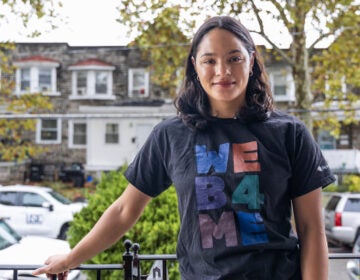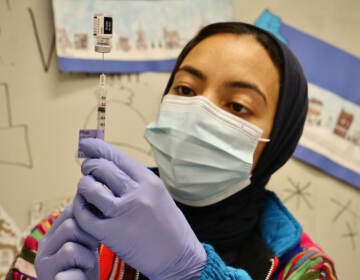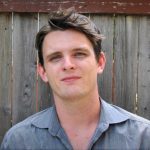Group entrusted with Philly vaccine clinic abandoned testing, stranding communities
Many in the city’s medical community were surprised when Philly Fighting COVID opened a mass vaccination site — and stopped offering free neighborhood tests.
Listen 3:39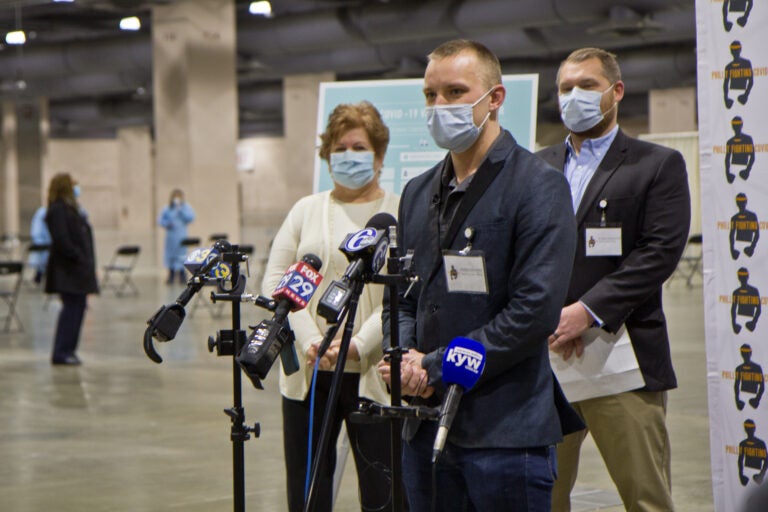
Philly Fighting COVID CEO Andrei Doroshin speaks at the opening of the community vaccine clinic at the Pennsylvania Convention Center. (Kimberly Paynter/WHYY)
Ask us about COVID-19: What questions do you have about the current surge?
Siria Rivera watched anxiously last week as a line of people waiting to get coronavirus tests formed outside the Providence Center, the North Philadelphia educational nonprofit she helps run.
She hoped Philly Fighting COVID would show. The start-up organization, which hosted pop-up testing around the city since summer, had recently cancelled several times. But the group promised they’d be back in Fairhill this time.
Half an hour before testing was supposed to begin, Rivera got the email.
“The Department of Public Health asked us to set up a mass vaccination clinic this week,” wrote Victoria Milano, Philly Fighting COVID’s site manager. “Because of this, it will not be feasible to continue testing.”
Rivera pleaded. Many residents of the predominantly Latino and Black neighborhood needed access to walk-in testing for work. Some had symptoms; many were without health insurance. Rivera’s nonprofit had advertised the event.
“We have worked hard for 26 years to gain their trust,” Rivera wrote back. “If we can’t keep our word on this, that will change.”
The response: silence.
Turns out that two days before Rivera’s scheduled event, Philly Fighting COVID had announced via social media that it was immediately suspending all testing pop-ups to “focus on vaccine operations.”
That’s not what the organization indicated when those “vaccine operations” rolled out. On Friday, Jan. 8, CEO Andrei Doroshin spoke at the city’s first mass vaccination clinic, which the Philadelphia Department of Public Health had authorized Philly Fighting COVID to run. There, Doroshin outlined ambitious plans to add two new drop-in testing sites and also expand to offer free rapid testing for all city residents.
Over the weekend, the young start-up exec had apparently reversed course — and left community leaders in the lurch.
“They completely ghosted us,” said Cean James, pastor of Salt & Light church in Southwest Philadelphia, who had a planned series of testing events he said the group abruptly abandoned.
Other community leaders said Doroshin not only turned his back on testing, but dismissed the very operation on which he built his legitimacy as “irrelevant” and panic-inducing. Doroshin later denied making that statement, and countered that community groups who criticized him should have been grateful for his services.
“I suggest you go back to the community members who were giving you a hard time and ask them if we’ve tested their people, and they will say yes,” Doroshin said in an interview with WHYY News. “Ask them if they were on time every time to open the doors.”
In a separate interview, Karol Osipowicz, Philly Fighting COVID’s chief science officer, said low demand for testing spurred the sudden decision to concentrate only on vaccinations. Community leaders disputed the suggestion that demand was low.
The abrupt change of course adds to growing questions over Philly Fighting COVID’s key role in the city’s pandemic response. Approved for an allocation of the city’s limited vaccine supply, the 9-month-old start-up could begin billing health insurance companies after months of unprofitable testing operations.
At the same time, city officials are distancing themselves from their partner’s efforts — including PFC’s rollout of the city’s first ever vaccine sign-up site.
Early in the pandemic, Philadelphia health officials demurred on establishing their own mass testing facilities, instead relying on organizations like Philly Fighting COVID, the Black Doctors COVID-19 Consortium, and other health care groups to provide the service. The same array of disparate providers are being depended on for vaccinations.
Skipping out on MLK Day because tests ‘cause panic’
Formed in April as a student-run nonprofit out of Drexel University, Philly Fighting COVID began its existence manufacturing PPE using 3D printers at a warehouse in the Kensington neighborhood.
When the frenzy for protective gear had settled, Doroshin, a master’s degree student in the neuroscience program, pivoted to help fill the testing void.
By July, the group was running pop-ups where residents could go without a doctor’s note — or even having symptoms. Philly Fighting COVID said it has run more than 20,000 tests, a number chief science officer Osipowicz described as “half of the testing in the whole city.” That’s a mischaracterization, the city confirmed, as Philly sites perform upwards of 7,000 tests per day.
Elijah Blanton, a community organizer with the Philadelphia Liberation Center in Kensington who said he helped PFC promote its free testing sites and connected it to other nonprofits, had praise to offer.
“In some ways, it’s a tragedy that the city has had to depend on this small nonprofit to do its public health response,” Blanton said, “but in other ways, it’s very impressive.”
Throughout the fall, Philly Fighting COVID built a network of community partners in underserved communities, many of which came to rely on the efficient, low-barrier testing events, for which the group received city funding. With pop-up sites in predominantly Latino and Black neighborhoods, PFC touted its work in closing the racial disparity in testing.
“There was a lot of verbiage that this wasn’t just a business model for them,” said James, the pastor in Southwest Philly. “After their completely abandoning testing and moving to vaccinations, it does kind of seem that way.”
A consortium of community groups, churches and civic leaders in Northwest Philadelphia had been planning a massive MLK Day testing and food giveaway at Martin Luther King Jr. High School for months. Philly Fighting COVID had agreed to provide the tests.
Days before the event, Doroshin attended a Zoom planning meeting and announced he wanted to provide the vaccine instead of performing tests, they said. The various leaders were taken aback — feeling there was too much uncertainty in the community about the vaccine to be ready for such a dramatic switch.
Michael Brown, head of the Action for Justice Collective, one of the Northwest groups in the consortium, said Doroshin was very clear.
“‘I don’t believe that testing is relevant anymore,’” Brown recalled Doroshin saying. “‘People don’t follow the instructions, people don’t do what they’re supposed to do, and all it does is’ — and I quote — ‘is cause panic’.”
Although Doroshin later apologized, the overall feeling was that he’d already showed his hand. “Trust already left the room,” Brown said.
Doroshin denied he ever said testing was irrelevant, and told WHYY the community members must have misunderstood what he meant.
“A very basic point I’m trying to make to a lot of people in the testing community is you should get ready for vaccines,” Doroshin said in an interview. “Whoever said that must have misconstrued what I said because actions speak louder than words and we’ve done more testing than almost anybody.”
State Rep. Stephen Kinsey, of Northwest Philly, called the abrupt programming shift before MLK Day “deeply troubling.” At the 11th hour, the consortium was able to secure a new group to provide the testing.
Gap in city testing capacity remains
Philly Fighting COVID maintains it switched away from testing because the city asked for help setting up a vaccination clinic. “It’s really the Health Department here who’s giving us a shot — they’re trusting us with their vaccines,” Doroshin said at the facility’s opening.
The city said it was the other way around.
“PFC approached the Health Department saying they would be willing to run a mass clinic at the Convention Center to vaccinate a high-risk population,” said department spokesperson James Garrow. The department did measure the proposal against federal and local health regulations, “but the plan was and is exclusively theirs.”
Either way, one organization’s departure from Philadelphia’s testing landscape should not have left such a gaping hole in underserved communities, said State Rep. Danilo Burgos, whose North Philly district missed a PFC testing site on Erie Avenue.
“I don’t know why the city didn’t use the federally qualified medical centers that we have strategically located in the most needy areas of the city,” Burgos said. “I don’t know why they used a third-party system when we have good systems in place.”
Doroshin said Philly Fighting COVID reached out to all the city’s large medical institutions and asked them for help, but the call went unanswered. “The health care systems weren’t doing anything, so we figured we would,” he said. ”Those health care institutions don’t care about vaccines on a community level. There’s not enough money in it for them.”
Representatives for Penn Medicine and Jefferson Health did not return requests for comment on their involvement in the vaccine rollout. Hospitals and other health care institutions have begun vaccinating their own staff members.
Rob Biddle, an architect and Fishtown resident who was tested at a Philly Fighting COVID site, directed his frustration toward city government.
“The fact that testing responsibility is being outsourced to nonprofits who have their own motivations and responsibilities and issues with staffing really sets you up for … potential failure and for gaps in coverage,” Biddle said.
No city funding is used to pay for vaccinations, but Philly Fighting COVID now stands to profit from them. When it was just operating testing sites, PFC was a nonprofit. Along with the switch to vaccinations came the founding of a for-profit arm, Doroshin confirmed.
Back at the Providence Center in Fairhill, Rivera is still looking for another group to perform coronavirus tests for neighborhood residents.
She viewed Philly Fighting COVID’s testing pop-ups as a kind of bait-and-switch to gain vaccines.
“What they’ve done is created this facade of being collaborative and grassroots and community-based in order to make a case for this [vaccination operation] they’ve been granted,” Rivera said. “And it’s a shame that it’s been on the backs of our community.”

Get daily updates from WHYY News!
WHYY is your source for fact-based, in-depth journalism and information. As a nonprofit organization, we rely on financial support from readers like you. Please give today.


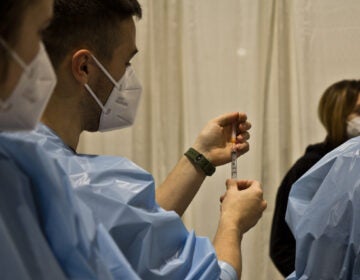
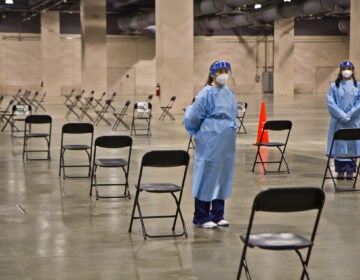
![CoronavirusPandemic_1024x512[1]](https://whyy.org/wp-content/uploads/2020/03/CoronavirusPandemic_1024x5121-300x150.jpg)

